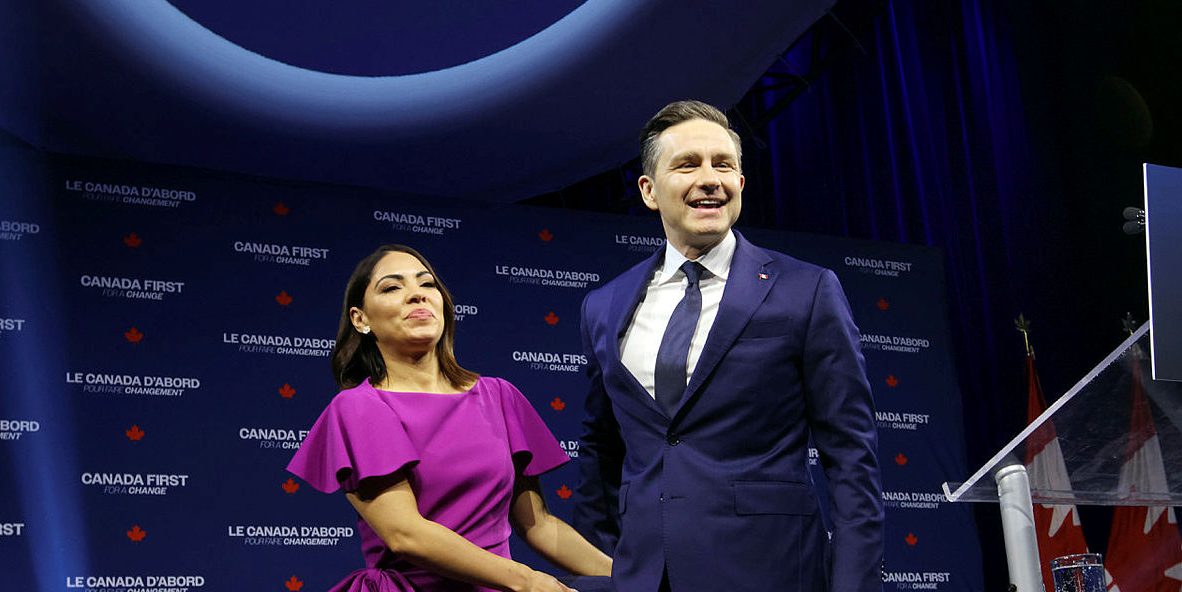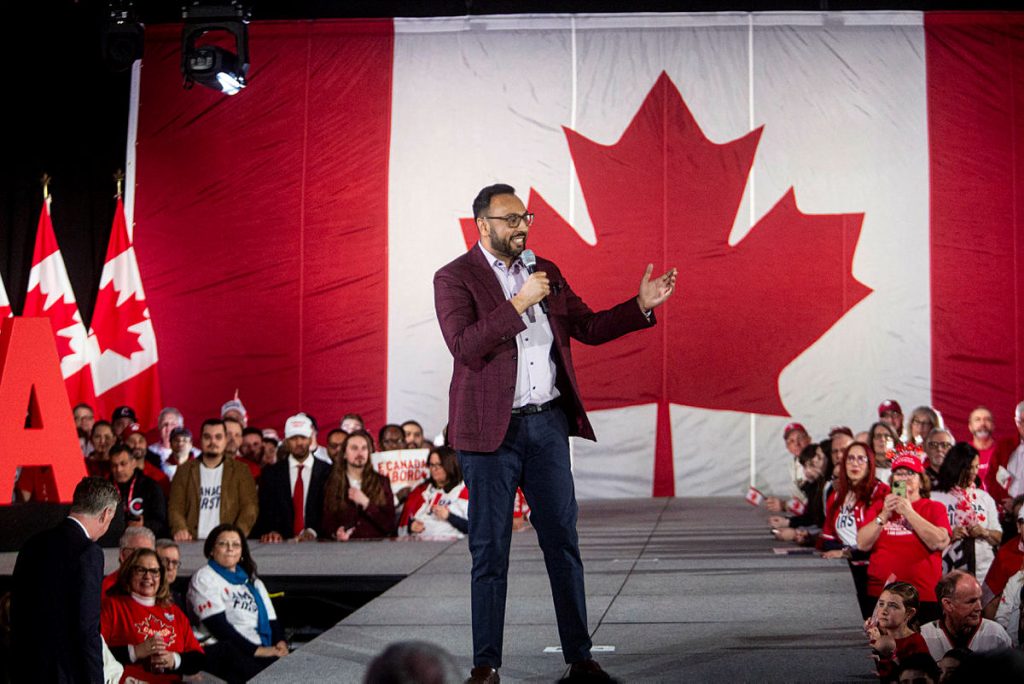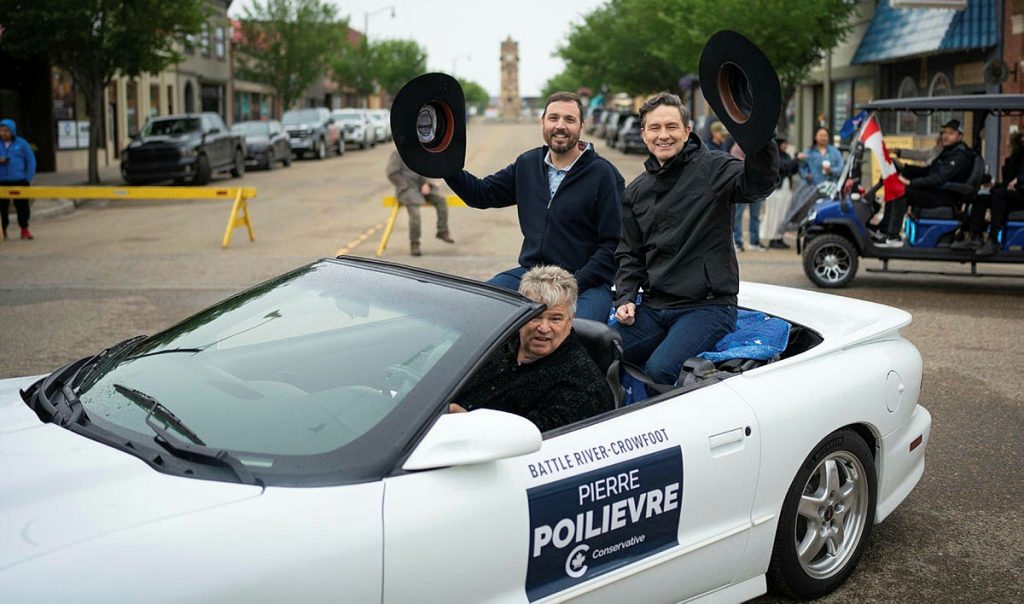Conservative MP Khanna mobilizing support for Poilievre’s upcoming leadership review, say Conservative sources

While Pierre Poilievre is preoccupied with his August byelection and with “grumbling” about his leadership getting “louder,” Conservative MP and national outreach chair Arpan Khanna is reaching out to his party’s unsuccessful candidates from the last election, urging them to help elect as many delegates as possible for the Jan. 29, 2026, biennial policy convention to help their leader win the upcoming leadership review.
“What he’s [Khanna] really doing, he’s building delegates,” one former Conservative candidate told The Hill Times. “So he’s whipping support for the leader and he’s going to be successful. This definitely falls within the scope [as national outreach chair] of that. He’s doing what’s in his best interest and the leader’s best interest.”
Poilievre is set to face a mandatory leadership review, as required by the party constitution following an electoral defeat. While there is no fixed threshold he must meet to stay on as party leader, some current and former senior Conservatives point to the support he received of 68 per cent in the 2022 leadership race as a potential benchmark. Falling short of that figure could “jeopardize” his position, these insiders opined.
In the 2022 leadership contest, former Quebec premier Jean Charest placed a distant second with 16 per cent of the vote, followed by Conservative MP Leslyn Lewis (Haldimand-Norfolk, Ont.) with 9.6 per cent, now-Conservative MP Roman Baber (York Centre, Ont.) with five per cent, and Conservative MP Scott Aitchison (Parry Sound-Muskoka, Ont.) with one per cent. At the time, the Conservative Party had 678,000 members, 438,000 of whom cast their votes in the leadership election.

According to the Conservative Party constitution, each of the 343 ridings may send 12 delegates, including the electoral district association president and the candidate of record or incumbent MP, to the convention. Additionally, all 20 elected national councillors, former party leaders, and members of the national policy and constitution committees are also eligible to attend.
In a leadership review vote, party leaders decide themselves if they received adequate support to remain in place, or step down and trigger a new leadership election. In 2022, then-United Conservative Party leader Jason Kenney resigned from his role as premier of Alberta after earning just 51.4 per cent support in his leadership review. In 2016, then-federal NDP leader Tom Mulcair stepped down after receiving only 48 per cent. And in 1983, then-Progressive Conservative leader Joe Clark triggered a leadership election after securing 66.9 per cent of the vote.
At last month’s quarterly meeting in Ottawa, the Conservative Party’s national council decided its next convention would take place in Calgary. The decision was made to change the location—which was originally supposed to be Ottawa—not only because Poilievre lost his Ottawa-area seat in the April 28 election, but also because the party hadn’t won any seats in the capital, according to senior Conservative sources.
Poilievre is now running in an Aug. 18 byelection in the Alberta riding of Battle River—Crowfoot, vacated by now-former Conservative MP Damien Kurek. With the riding being in one of the safest Conservative regions in the country, Poilievre is widely expected to win this byelection with a comfortable margin.
At this time, it appears that Poilievre will get strong support in his leadership review from party grassroots members. In addition, there’s no challenger waiting in the wings to undermine Poilievre’s leadership. According to Conservative sources, Khanna (Oxford, Ont.) recently told former candidates that he doesn’t expect any serious challenge to Poilievre’s leadership.
The last election result was devastating for party members, candidates, and the leader as for close to two years, the party led in the polls by a high double-digit margin.
In early January, the Conservatives were leading with a 27-point margin, but the political landscape changed after then-prime minister Justin Trudeau announced his departure plan and Mark Carney ran for the Liberal leadership. United States President Donald Trump’s trade war also played a key role in the remarkable turnaround for the Liberals in the April 28 election. At the time, the Conservatives were projected to win a super majority of 220 seats. To seize the momentum, Carney called an early election and won a strong minority government. The Conservatives failed to form government, and Poilievre failed to win back his own seat.
One of the criticisms that Poilievre is facing for the election loss was that his campaign failed to pivot in time when it was clear that Trump’s tariffs were top of mind for Canadians. The campaign focused chiefly on cost-of-living issues. During the election, senior Conservatives like Kory Teneycke, who was communications director to former prime minister Stephen Harper, went public with his criticism that the federal Conservatives were not focusing enough on the Trump tariffs.
In the last election, the Liberals won 43.7 per cent of the vote and secured 169 seats, which are just three short of a majority in the 343-member House of Commons. The Conservatives received 41.3 per cent of the vote and captured 144 seats. The Bloc Québécois—which fields candidates only in Quebec—and the New Democratic Party each garnered 6.3 per cent of the vote, with the Bloc winning 22 seats and NDP taking seven. The Greens earned 1.2 per cent of the vote, and managed to win just one seat.
In comparison, after the 2021 federal election—when the House had 338 seats—the Liberals won 160 seats, the Conservatives 119, the Bloc 32, the NDP 25, and the Greens two.
In interviews with The Hill Times, Conservative sources said that Khanna has been meeting with former candidates to gather their feedback on the last election and to discuss potential changes the party should consider. He is also asking whether they plan to run again, and is encouraging them to bring as many delegates as possible to the upcoming convention in support of the party leader.
During these conversations, Khanna has reminded these candidates that riding associations can help subsidize the cost of attending the convention—which can range from $2,000 to $3,000 depending on travel, accommodations, the convention fee, and other expenses. According to Elections Canada, riding associations are permitted to cover boarding and lodging costs, and parts of the convention fee.
Prior to every party convention, each electoral district association decides whether to subsidize and determines the amount based on the funds available in their bank accounts.

Conservative sources told The Hill Times last week that most—if not all—former candidates reassured Khanna that they would support the leader. But some former candidates told The Hill Times the election took place only two months ago, and they are still processing the loss.
After all the hard work and sacrifices they made, many are unsure about reoffering again. They said that their decision would depend on whether the recommendations they shared with the party leader during his post-election review are taken seriously, and whether meaningful changes—both personnel and policy—occur within the party. Until then, they are hesitant to commit to recruiting and sending delegates to the January convention in Calgary, citing concerns about the winter weather, the post-Christmas return to regular life, and the question of whether it’s worth the effort if they don’t intend to run again.
They said that, at the moment, members are not having honest talks about the leadership review happening—even among former candidates—because as soon as discussions begin, people go into self-preservation mode out of concern their comments might make it back to the leadership team. They also want to see what changes Poilievre brings once he returns to House, and whether those changes are substantial enough to reassure candidates and party members that they can realistically win the next election under the current leader.
“If nothing changes at the top, there’s no point of running again,” said a second former Conservative candidate who met with Khanna recently. “I’m not going to go out of my way to encourage people to go to the convention. If they go, they go.”
Incumbent Conservative MPs and candidates of record are the party leader’s local representatives on the ground; they serve as important points of contact for Poilievre within their communities as most ridings have hundreds or thousands of card-carrying party members in each riding association.
Khanna was not available for an interview, but sent a written statement for this article.
“Pierre has my full support and everywhere I go, Conservatives are united behind him. We smashed records, won new seats coast to coast, and delivered the highest vote percentage in modern Conservative history,” wrote Khanna. “He broadened our voter coalition, inspiring a new generation of supporters, and even earning endorsements from labour unions. Under Pierre Poilievre’s leadership, our Conservative movement is bigger, stronger, and more energized than ever.”
Meanwhile, two veteran Conservative-leaning columnists last week wrote that grassroots members of the party are not as enthusiastic about Poilievre as they were before the April 28 election.
“There was bitterness, anger, a desire for change and outrage over how the general election campaign had gone. Rather than that anger being directed at those around Poilievre, this time it was aimed at him,” wrote Sun Media columnist Brian Lilley last week.
“Former political staffers, campaign volunteers, fundraisers and more were all willing to vent their spleen and express their frustration. For those asking, these were not Doug Ford conservatives who had flown in from Ottawa or Toronto for the Stampede, these were rock-ribbed conservatives upset at their party snatching defeat from the jaws of victory.”
Long time National Post columnist John Ivison also echoed similar views on his Substack last week.
“MPs say privately they are resisting efforts to draw them closer into the leader’s orbit. Outgoing staff say that while Jenni Byrne is being blamed for an election strategy that snatched defeat from the jaws of victory, the real architect was Poilievre himself, who micromanaged every aspect of the campaign,” wrote Ivison.
“One former employee said Conservatives are openly laughing at efforts by chief of staff, Ian Todd, to re-staff the Opposition Leader’s Office. Some of Poilievre’s closest supporters don’t sound convinced the leader will make it through January’s review.”
arana@hilltimes.com
The Hill Times






 LICENSING
LICENSING PODCAST
PODCAST ALERTS
ALERTS













